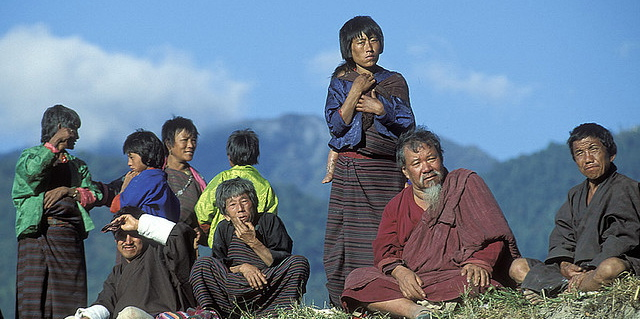
The mountainous Kingdom of Bhutan straddling the eastern Himalayas between China and India is guided by the unique development philosophy Gross National Happiness (GNH), which seeks to maximize happiness as the basis for development, instead of pursuing purely economic growth. It is based on four pillars: good governance, sustainable socio-economic development, cultural preservation, and environmental conservation.
Bhutan has committed to “green growth” to guide the country’s economic development. Green growth is a term used to describe a path of economic growth that emphasizes the sustainable use of natural capital while limiting risks to human health and irreversible degradation of the natural environment.
To develop policies for how the country can pursue this path, the Bhutanese Government requested that the World Bank develop a policy note on green growth, which was released in July 2014. It showed “green growth is at the heart of Bhutan’s development philosophy” and that a significant portion of Bhutan’s current and prospective economic gains come from the use of natural resources.
Overall, Bhutan is on a strong growth trend: growth has averaged around 9 percent per year over the past decade and is expected to remain at 8 percent per year over the next five years. The rate of extreme poverty has fallen to just 2 percent of the population.
Natural resource-dependent sectors play an important role in Bhutan’s GDP. Agriculture, livestock and forestry account for 13.4 percent of GDP, but annual growth in agricultural net output has been fairly low. Hydropower directly contributes 12.5 percent of GDP, and up to 30 percent with indirect impacts such as construction, but the note points out that employment generation in the hydropower sector is low.
One of the note’s five recommendations is that the government build the capacity to mainstream natural capital, including ecosystem services, in Bhutan’s national development planning and national income accounts.
To accomplish this, the authors suggest developing natural capital accounts in the following sectors, which are abundant and of economic importance to the country:
- Watershed accounts to assess the value of water regulation and soil retention services from watersheds for hydropower generation to help hydropower development in the state forests, which contribute directly to the economy by providing other goods and supporting the tourism industry.
- Forest accounts to assess the contribution of forests to the state’s GDP and support policies to increase contribution sustainably. Under its constitution, at least 60 percent of the country’s land area must remain forested. In 2010, about 70.5 percent of the land was defined as under forest cover.
- Mineral accounts to understand the extent to which rents are being captured and used to support economic diversification.
- Tourism accounts to inform policies in this sector, which is an important contributor to export revenues because of Bhutan’s pristine natural environment.
The note says the information from accounts can help policymakers manage these important natural, economic assets and that such efforts would complement and strengthen the already innovative approach in Bhutan to plan and track economic growth, and would also complement their quality of life goals.
“Bhutan is on a green growth path through their GNH philosophy, but to meet current economic challenges they need to strengthen their green growth policies and accounts can help provide the data to do that,” said Urvashi Narain, a senior environmental economist working with the Wealth Accounting and Valuation of Ecosystem Services (WAVES) partnership, and one of the authors of the policy note.
A draft of the note was presented to the government in May at a one-day workshop on green growth. Narain said the government has a strong statistics department, and their capacity to construct natural capital accounts could be strengthened with further training and capacity building.
Bhutan is a signatory to the NCA 50:50 initiative, and has worked on energy accounts with Statistics Denmark and are starting work on ecosystem accounts with the UN Statistics Division (UNSD).
With the expansion of WAVES in the future, it could play a bigger role in Bhutan to provide technical assistance to develop accounts and help them operationalize green growth in a more robust manner.
